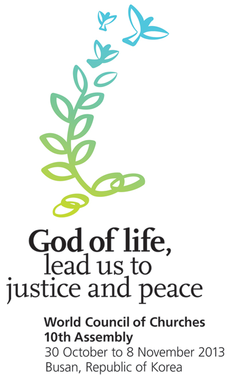Holding on to faith traditions, Uganda churches build their country
12 June 2013
“Uganda is a country of strong Christian witness. It is a country of Christian martyrs like Archbishop Janani Luwum, who lost his life at the hands of Idi Amin. It is therefore natural that we get together in Uganda to see what peace, justice and dignity mean to the African churches.”
Canon Grace Kaiso shared these views in an interview on 5 June, following his presentation at the All Africa Conference of Churches (AACC) 10th Assembly in Kampala, Uganda.
Kaiso from the Church of Uganda, a member church of the World Council of Churches (WCC), explained that it was Archbishop Janani Luwum's criticism of arbitrary killings and disappearances which resulted into his arrest and his assassination at the hands of Idi Amin regime in 1977.
Histories like these, as well as the establishment of the AACC in 1963 which also took place in Uganda, are affirmations of churches' struggles for justice in the country, according to Kaiso.
Yet, the issue of dignity is a challenge for the African churches.
“We have suffered from massive dehumanization in Africa,” said Kaiso. “Unfortunately our image is constituted by the leaders of impunity like Idi Amin, corruption and conflicts. Therefore, dignity is a pertinent element in our struggles for lasting peace in the African region.”
His reflections pointed towards the theme of the AACC's assembly “God of life, lead Africa to peace, justice and dignity”. The AACC is celebrating its 50th anniversary as a regional ecumenical organization.
“The dignity of a person is closely attached to the dignity of the Creator. Therefore churches in Uganda have to live up to the challenge of ensuring the dignity of its people who are faced by a scarred image created by wars, religious intolerance, disease and poverty,” said Kaiso.
Uganda is predominantly Christian, with Islam as the second major religion. People of both faiths have suffered from political instability and economic disparities, Kaiso reported.
“Uganda has a lot of potential for growth and progress. If we harness human capacities as churches, and continue working with our rich faith traditions, we can built a stable and thriving country,” he said.
Kaiso, an ordained minister of the Anglican church and general secretary of the Council of Anglican Provinces of Africa, thinks that churches should move from “diagnosis to the healing of communities”.
He pointed out that the realities of churches in Uganda include inequalities, HIV and AIDS, threats of globalization, environmental issues and the welfare of women and children. He said that the “prophetic role” of the churches in Uganda is to engage with the political powers in addressing these issues.
Kaiso added that churches can play their “prophetic role” only with a strong engagement of women and youth in the communities. He said that women are the “wheels of the churches”; without their time, contributions and commitment, churches cannot achieve their vision for justice, peace and dignity.
There are still issues to be addressed when it comes to the leadership position of women and youth in the churches, yet they are in the forefront of Christian witness in Uganda, said Kaiso.
The AACC's theme is inspired by the theme of the WCC's upcoming assembly “God of life, lead us to justice and peace”. The WCC gathering is set to take place from 30 October to 8 November in Busan, Republic of Korea.
Churches seek life, peace, justice and dignity for Africa (WCC news release of 10 June 2013)
High resolution photos may be requested via photos.oikoumene.org





